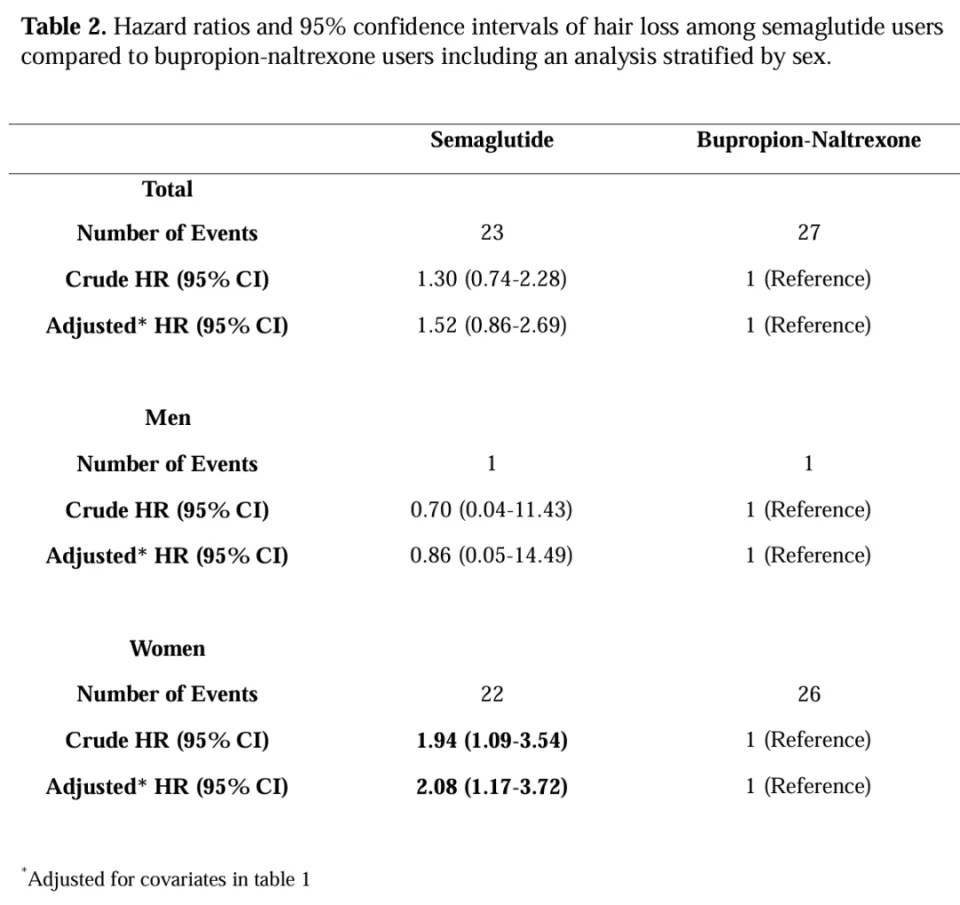Semaglutide and Hair Loss Risk:A New Study Reveals Potential Issues
Semaglutide,a weight-loss drug that has garnered significant attention,is widely popular due to its remarkable weight-loss effects and various health benefits.However,a recently published study indicates that the use of semaglutide may be associated with an increased risk of hair loss,particularly among women.This article will provide a detailed introduction to the background,methodology,results,and potential implications for clinical medication use of this study.The research suggests that despite semaglutide's excellent performance in weight loss and other health aspects,the potential risk of hair loss needs to be taken seriously,especially for female users.

Semaglutide is a drug that has attracted considerable attention in the field of weight loss.In addition to its significant weight-loss effects,it is believed to reduce the risks of suicide,cardiac arrest,and dementia,demonstrating multiple health benefits.However,every drug may have its drawbacks.Previous studies have mainly focused on the gastrointestinal adverse reactions of semaglutide,while research on its potential to cause hair loss has been limited.Although the U.S.Food and Drug Administration(FDA)has hinted that GLP-1 receptor agonists(a category that includes semaglutide)may be associated with hair loss,there has been a lack of real-world studies,especially among individuals using semaglutide solely for weight loss.
Recently,a study titled"Risk of Hair Loss with Semaglutide for Weight Loss,"published on medRxiv,revealed an association between semaglutide use and an increased risk of hair loss,particularly among women.This large-scale retrospective cohort study aimed to thoroughly investigate the relationship between semaglutide use for weight loss and the risk of hair loss,in order to provide more comprehensive safety data for clinical medication use.The study was based on the IQVIA PharMetrics®Plus for Academics database,which randomly selected health claims data from 16 million people between 2006 and 2020.It included new users of semaglutide and bupropion-naltrexone as the control group.The study excluded patients with a history of diabetes or those who had previously used antidiabetic medications to ensure that the subjects were using these drugs solely for weight loss.The study used a Cox regression model to calculate the hazard ratio(HR)and adjusted for multiple confounding factors,including age and gender.Follow-up began from the first prescription of the study drug and continued until the first diagnosis of hair loss(defined by ICD-9 or ICD-10 codes)or the end of follow-up.
The study results showed that among the 1,926 semaglutide users and 1,348 bupropion-naltrexone users included in the analysis,the bupropion-naltrexone users were younger and had a higher proportion of women compared to the semaglutide users.The incidence rate of hair loss in the semaglutide group was 26.5 per 1,000 person-years,while it was 11.8 per 1,000 person-years in the bupropion-naltrexone group.After adjusting for confounding factors,the overall hazard ratio for hair loss in the semaglutide group was 1.52(95%confidence interval:0.86-2.69),with a hazard ratio of 0.86(95%confidence interval:0.05-14.49)for men and 2.08(95%confidence interval:1.17-3.72)for women.This indicates that compared to bupropion-naltrexone users,women using semaglutide had a significantly increased risk of hair loss.

Despite its excellent performance in weight loss and other health aspects,semaglutide presents a potential risk of hair loss that needs to be taken seriously by women considering its use.The possible mechanisms include physiological stress from rapid weight loss,nutritional deficiencies,and the synergistic effects of other adverse events.Hormonal changes may also play a role.However,the study has certain limitations,such as the lack of detailed data on indications for drug use,making it impossible to fully determine whether all participants were using semaglutide solely for weight loss.Further research is needed to clarify the causal relationship between GLP-1 receptor agonists and hair loss and to explore the specific mechanisms behind hair loss.
Thank you for your attention and support! We are a company specializing in the research, development, and production of GLP-1 API (Active Pharmaceutical Ingredient), committed to providing high-quality raw pharmaceutical products to our clients. If you have any related needs or would like to learn more, please feel free to contact us at any time!
Contact Information:
Email: laura@horwats.com
Phone: +86 19052757106
We look forward to collaborating with you to drive progress in the pharmaceutical and healthcare fields, delivering better medical solutions to patients worldwide!




